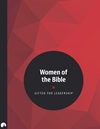How to Figure Out Your Calling

I was 19 when I met Amy Orr-Ewing—the British speaker, writer, and evangelist that CT’s Katelyn Beaty deemed “among the most prominent apologists in the UK today” in a recent cover story. We were both students at Oxford University at the time, and we met through the student ministry at St. Aldates Church—a lively group that went by the memorable, slightly awkward name of “Risky Living.” But Amy and her now-husband, Frog, did, in fact, embody some of the riskiest living I’d ever seen in Christian peers, and that’s still the case today.
Today, Amy serves as the regional director of Ravi Zacharias International Ministries for Europe, the Middle East, and Africa, and as the director of the Oxford Centre for Christian Apologetics. She writes books, teaches and trains in evangelism, and co-leads a unique and growing church. While she wears many hats, she is anchored by a central calling to evangelism and apologetics. Amy is an inspiring example of a woman passionately and relentlessly pursuing her calling, and encouraging others to do the same.
As a high schooler, Amy went on international mission trips with YWAM (Youth with a Mission), which initiated her training and experience in evangelism and public speaking. She says, “Through my teen years, the Lord put the dream in my heart of being an apologist . . . though I wouldn’t have called it that at the time. I thought of it as ‘the life of the mind,’ and I just knew that I wanted to extend faith to others though that vehicle.” By the time she was a student at Oxford, Amy was accustomed to giving talks about her faith and did so regularly, wherever God gave her opportunity. She had a big picture idea of where she felt God was leading her, but she wasn’t sure exactly how it would play out.
“In my final year at Oxford,” she says, “Frog and I were praying about my vocation and future direction, and we decided to lay a fleece before the Lord. If I got a first-class (Oxford’s top degree, received by very few students), I’d go into academia and pursue apologetics head-on. If I didn’t, I’d go into law and weave apologetics into that career.” When she did indeed earn first class, she became confident in her calling to apologetics, even turning down a job at a prestigious law firm. Orr-Ewing says, “It wasn’t the type of place people said “no” to,” but she was convinced God was leading her somewhere else.
Soon after, she began a Master’s program in theology at King’s College and continued accepting invitations to speak. Less than two years later, Amy was approached by Michael Ramsden and Ravi Zacharias to see if she’d consider helping them pioneer apologetics training in Europe based at Oxford. She accepted, and her personal ministry and the organization’s ministry grew from there.
How Can I Know My Calling?
“In moving into my calling, there was a combination of being proactive—pushing on doors and exploring options—and also asking God to guide me through his Word, my dreams and passions, the prophetic, and the circumstances I found myself in,” Orr-Ewing says. She sees more anxiety about vocation among millennials than when she was a young adult. “In my era, we prayed it through, and then started off; we felt that God could guide us supernaturally during the process. But today it seems harder, and I see more hesitation and concern along the lines of ‘I’m not sure;’ ‘Is this right?’ ‘Am I hearing God?’ I try to encourage young leaders to try things—to go for it. God can speak to us as we go.”
Orr-Ewing fields plenty of questions from her audiences, especially about how to identify one’s calling. The first things to consider are the gifts, training, and opportunities God uniquely gives to each person. Then, she refers to the dreams and passions of the heart, those activities or communities one’s drawn to. Lastly, she unpacks what she and her husband call the three P’s. “The first P is people—who are the people God’s put in my life to serve with, to journey with in my work? The second P is purpose—hearing from God what he wants us to do through the Bible, prophetic words God gives us, or words from other people. And the third P is place—where has God put you? Start where you are. Even for those of us who are called to work internationally, we are still to have a rootedness and involvement in our home locale.”
While Amy has a well-defined and prominent career, she’s no stranger to the average Christian’s modern-world struggle to nail down calling. The abundant opportunities in our hyper-connected world can heap doubt and insecurity onto even the most intentional. The Christian version of “FOMO” (fear of missing out) can be a fear that our efforts to serve God are too small or insufficient. She emphasizes that smaller in scale, however, is not smaller in importance. She knows the Sunday school class she teaches for 10-year-old boys at her church is just as important, kingdom-wise, as a talk she may give to staffers on Capitol Hill. “I passionately believe the two are just as significant in God’s eyes.”
Amy sees the battle to find calling as both spiritual and cultural. “When I counsel someone who feels a cloud over them, wondering if God’s displeased with what she’s doing with her life, I remind her that the Holy Spirit only convicts us of specific things he wants us to change. I suggest she get on her knees, pray, and fast for a day, and ask God if he wants her to make concrete changes in what she’s doing. If he reveals there are, then make those changes. If not, then I’d conclude the concern is a negative cultural and spiritual phenomenon to be resisted. I’d tell her to hold onto the gospel and his love for her as his child, and press on with what he’s put into her hand to do today.”
On top of that, women face unique challenges in pursuing their calling. For instance, there is often discouragement that develops when women enter a field without another woman to look up to. When Orr-Ewing was in her first years as an apologist in the late 1990s, there weren’t any female role models in public evangelistic ministry. Consequently, she has committed herself to improving the landscape for emerging evangelists, helping to create pathways for young women coming through.
Knowing the adversity women face as they lead in the church, Amy urges women to honestly settle, for themselves and before God, the raging questions about women’s roles. It’s important to do the work and look at the texts—especially those that are controversial. “This gives a woman a sense that, when things are difficult, she feels peace about her convictions and can see the struggle through a clear lens. Then, place yourself in a situation where it’s possible to flourish—even a simple one like leading a Bible study. If you can’t find one, create one. And from there, as a woman growing in experience, be determined to create an atmosphere that’s a safe, encouraging place to explore calling and vocation with both women and men involved in community, alongside each other.”
“Ultimately,” she says, “we should be seeking and fostering that human flourishing within God’s kingdom.” I can testify firsthand that Amy Orr-Ewing’s life exemplifies this kind of “human flourishing within God’s kingdom,” and it’s inspiring.
Susan Arico is a consultant, providing strategic and program-related assistance to Christian nonprofits.












